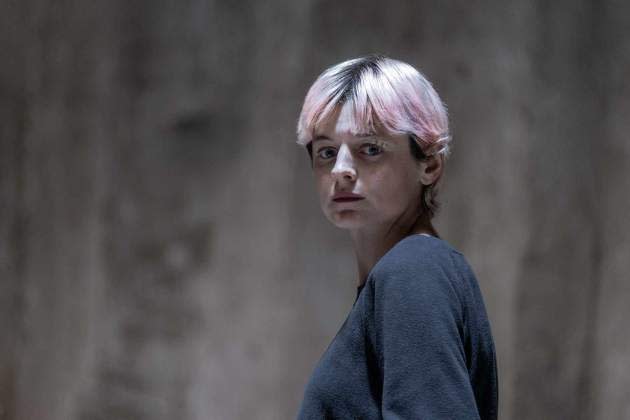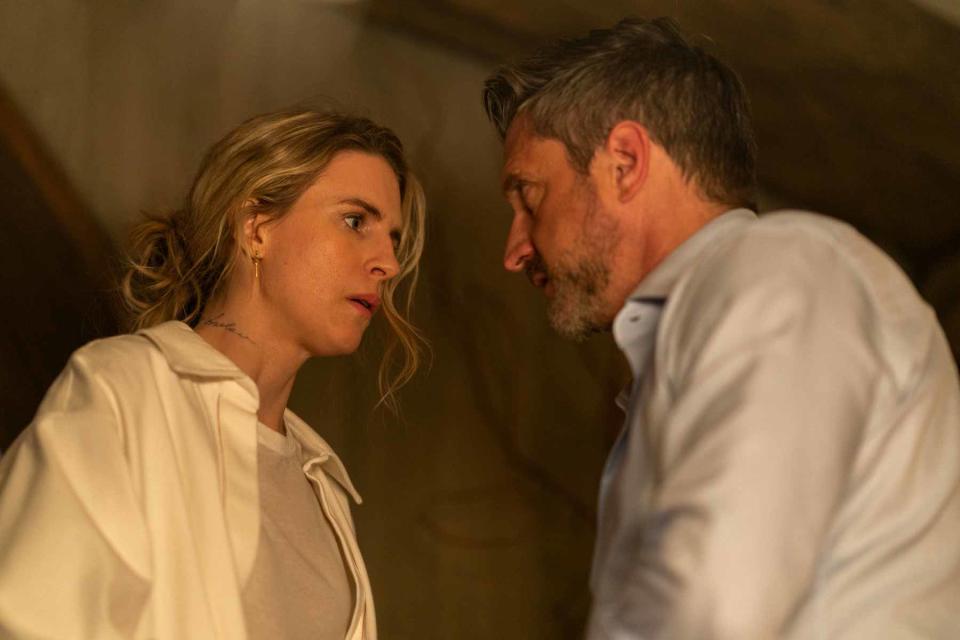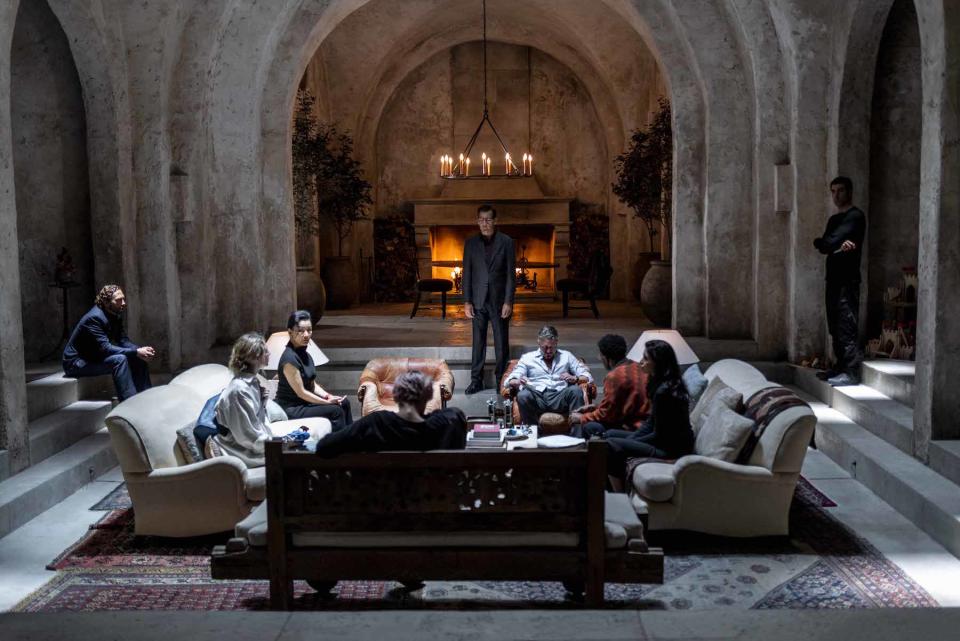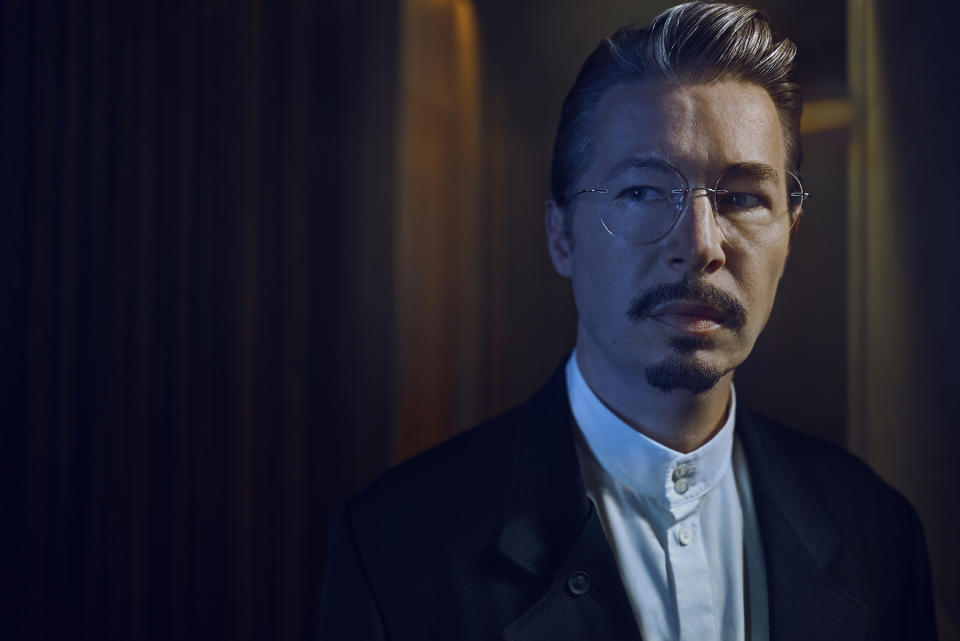‘A Murder at the End of the World’ Creator Brit Marling on That Finale Twist
- Oops!Something went wrong.Please try again later.

The FX series A Murder at the End of the World reached its conclusion on Dec. 19, finally revealing who’s been responsible for the series of killings at tech billionaire Andy Ronson’s (Clive Owen) remote Icelandic retreat.
Warning: Spoilers ahead.
More from Rolling Stone
Get Concert-Level Visuals And Elevate Your Stage Presence With this App-Controlled LED Wall
'Archer' Creator Adam Reed on the Hilarious Spy Show Coming to an End
Hacker-sleuth Darby Hart (Emma Corrin) discovers that it wasn’t Andy or his captive wife Lee (Brit Marling) but rather his AI assistant-creation Ray (Edoardo Ballerini) who’s sowed chaos among his guests, ordering Lee and Bill’s biological son, Zoomer (Kellan Tetlow), to kill Bill and Rohan (Javed Khan). She comes to the realization thanks to a line uttered by her late partner Bill (Harris Dickinson) in the flashback storyline when, after the two of them find their serial killer of women, Bill chalks the murderer’s motive up to “faulty programming.” Also, much of the action takes place in Andy’s underground bunker, which sounds awfully familiar to the bunker Mark Zuckerberg is building in Hawaii.
So, Darby and Lee destroy Andy’s server farm — sending Ray into the ether — while Lee and Zoomer escape via Rohan’s vessel to get away from the abusive Andy. And Darby finally has some degree of closure regarding her past with Bill and why she’s been summoned to this Bilderberg-esque summit of movers and shakers.
Rolling Stone spoke with Marling — who not only played Lee but also co-created the series with regular collaborator Zal Batmanglij and directed a number of its episodes — about that big finale twist, what the series is telling us about AI and the tech-billionaire class, and much more.
Could you talk about the decision to incorporate two storylines and how they dovetail in the season finale?
On a thematic level, it’s about how in the past, Darby and Bill are following in the wake of a serial killer and picking up the bones of all these unnamed women who have been killed and who nobody’s bothered to identify or solve the crimes of, and we deliberately keep that killer faceless or unimportant. We’re not interested in his psychology or why he did what he did. We’re more interested in the victims. But we are interested in talking about that force, and when Bill describes it as “faulty programming” and it swings back into the present, we’re trying to talk about the fact that so much of what is now animating all of us are codes that are being built that are harnessing data sets that are built from a history that is racist, is misogynist, is homophobic, does lead toward violence, does lead toward conquest and domination. The history of storytelling is that, so what happens when we start building systems out of this deeply flawed data set that comes from the world we’ve been living in thus far? Our attempt in braiding them was to show how similar those forces are. Ted Chiang described AI as being a “force-multiplier for capitalism,” and I think that’s the most eerily accurate definition I’ve heard of it so far. It’s everything we’ve been experiencing so far only faster and with an invisible hand.

How does Lee not know that Bill was the father of her son? She tells a story to Darby that Bill lost his hard-on while they were hooking up, which could be nonsense. But then you’re dealing with someone like Andy who could impregnate someone without their knowledge.
We were imagining that Lee went to her parents’ old house in Florida and was hiding out there because it was the one address that hadn’t been leaked on the internet, and the one place she could take refuge against this wave of online hate that came against her. And we thought that while she was there, different people who were moved by the manifesto could find their way to her. And two very different people but who have equal hacking and sleuthing abilities are Andy and Bill, and they both find their way to her at that house in Florida at different times. And we imagined, as is common in that space, they’re all in these different polyamorous relationships and that genuinely Lee assumed that Andy was the biological father, and Andy’s enthusiasm and excitement to be the biological father solidified everything. And then immediately, it was just getting into a luge where you’re moving to the house in New York, there’s staff, there’s security, and you’re getting swept up in that because you’re having a child, and then she realizes shortly thereafter that she doesn’t have a way out.
Let’s discuss the Zoomer twist, or the revelation that Zoomer killed Bill and Rohan on the orders of Ray, the AI assistant. Payoff matters so much in a murder-mystery, so did you twist yourself in knots coming up with the ending here? There are also a lot of Kubrick references in the show, and that’s the moment where you’re like, oh, this is The Shining meets 2001.
[Laughs] I love that. It’s funny: We never think to tell a story until we have the ending because I don’t think you really know what a story’s saying until you know its end. It was weird because Darby Hart as a character, and the idea of a technology retreat and a whodunit in that space, had been sitting in the back of our minds for five years. And the idea of Andy being an AI designer, when we were thinking about that four or five years ago, even our friends in the space were pushing back on it, saying, “AI isn’t going to get there anytime soon. Have him be interested in space.” But we really felt like, how can you not talk about this thing that’s going to so obviously shape all of our futures?

Its prospects are pretty terrifying.
When we arrived at what was true about it, which is that it’s less about the villainy of a sentient AI and more about the human weaknesses that get embedded in the code that are designing it — the biases, the fears, the anxieties, the lack of perspective — that is what is truly terrifying. And that AI is also borrowing from a data set or history that’s racist, misogynist, homophobic data and storytelling, and when you put that together, you have this cocktail that feels so dangerous. Zoomer entered into that and it didn’t become a whodunit but a tragedy about this man who has all these brilliant ideas, and is an exceptional person with tremendous drive, but who has great fear and anxiety about the world and the maintenance of his empire, and that the one thing he wants to protect, which is his son, he ends up destroying with his fears and preoccupation with the hoarding of his wealth and maintenance of his empire. He ends up poisoning the very thing he was trying to protect. When we came closer to shooting, so many of the things we wrote as science near-fiction ended up becoming science-present.
And it ends with Lee and Darby literally lighting up money to Vivaldi and blowing up a server farm, followed by the line, “There will be other Andys and Rays.” What do you feel this show says about not only late-stage capitalism but the motives of these so-called altruistic tech billionaires?
It’s funny that you and I first talked about The East because in some ways, it’s coming full circle from those feelings then. We wrote The East before Occupy Wall Street happened and before Snowden defected and was like, “What is happening to personal security and data?” And I think a lot of those things came to pass, and a lot of that spirit is still in there — this feeling that late-stage capitalism has this ruthlessness about it, and one of the big myths or ideas behind capitalism is it’s the most evolved system, and there have never been other systems that have worked better or could work toward a more sustainable, healthy, long-term future for us all. I think everybody at this point is pretty aware that the logic that operates inside late-stage capitalism is actually pretty irrational. At this point, it’s starting to seem like a kind of suicidal ideation. It’s not just irrational but has a death drive to it. And there’s this idea that the best and the brightest, Ayn Rand-style, will in the last moment save us all with some heroic act.
The favorite book of all these tech founders.
Exactly. Speaking of the power of fiction: This one woman pens a book that becomes the favorite book of every CEO.
It’s like Catcher in the Rye with assassins.
[Laughs] It’s as though we all have to become citizen-detectives like Darby, and we have to band together, and we have to call it out and say, “How do we the people build a logical, sustainable, healthy future that includes us surviving in concert with the ecology we’re a part of?” And it doesn’t feel too late. Part of the system’s design is to make you feel impotent or like there’s nothing you can do, but there are plenty of stories of people doing hopeful, cool shit — a lot of it involving technology — but it’s just a matter of who’s designing it, who’s wielding it, and what is it for.
Will there be more Darby Hart cases or is this the end of the line for her?
We definitely saw this as just a novel that has a beginning, middle, and end. But these days, it’s hard to say what anything is. I think it’s a lot about what’s happening in the world, and what the audience needs or wants to meet what’s happening in the world. I’m sure there could be another location and another set of circumstances that might call Darby into action, but it’s not anything we had planned.

To go back to AI, it plays a big role in the show and in the finale, and it just became a major point of contention during the recent writers’ and actors’ strikes. How do you generally feel about AI? I can see it having benefits in the medical field but the arts, not so much.
I feel like it’s after both of our jobs in a major way! Dylan Tichenor, our editor on this, cut There Will Be Blood and Brokeback Mountain — he’s so talented, and such a science-fiction head — and I remember him saying to me as we were working on this, even before Chat GPT-3 was released, is the thing that’s scary about the future is imagining a future where truth doesn’t exist because AI is able to generate so much — stories that seem real, people that seem real, real people from real life saying things they’ve never said. He thinks we’re going to enter a zone where everything exists on a scale of probability as to whether it’s true or not, so you’ll look at an image or a piece of video and there will be a score report saying, “This is 87% true, we think.” I think it will be a moment of time in terms of what the internet was. Because, prior to AI being released on us, everything was coming from the real world. Now, when you’re googling something or looking something up, you have no idea what’s being served to you. It’s this real inflection point.
To talk about the fate of storytelling, I get very worried when already our industry is moving toward economy of scale storytelling, which is that you need to make something that appeals to 50 million-plus people, it needs to be proven IP — whether it’s a toy, book, or bestselling novel. It’s moving that way, and then you add to that AI, and where is the humanness left in it? Where are the stories that we actually need to meet the challenges of our time, which, by virtue of their definition, can’t come from rehashing the past or nostalgia? They have to come from imagining futures we haven’t yet imagined. The idea that you’re going to replace authorship with computers recutting the past, to me, seems very scary. And I’m not a Luddite. I owe my career to the fact that I came of age at the exact moment that you could get a laptop, Final Cut Pro, an SLR camera, shoot a film on it for not that much money, and take that film to Sundance. But I’m just not that sure about the way we’re pursuing it right now. Something about it feels really unsettling.
Best of Rolling Stone

